Location
Salima District, Malawi
Goal
Following a model that succeeded in neighboring districts, this project will empower communities to protect Lake Malawi’s endangered and economically important fish through Fish Conservation Committees.
Project Field Partner
Ripple Africa is a charity registered in both the UK and the USA, working to improve the environment and local education in Malawi, Africa. The charity was founded in 2003 by Geoff and Liz Furber who both share a passion for Africa, especially northern Malawi.
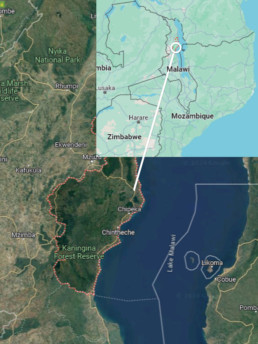
Maps data © 2024 Google
Lake Malawi is the world’s ninth largest freshwater lake and a biodiversity hotspot with more species of fish than any other lake in the world. Of its approximately 1000 species, 90% are endemic. The Lake’s fish are an important food source for millions and yet three of the four species of “Chambo,” the most important food fish, are critically endangered.
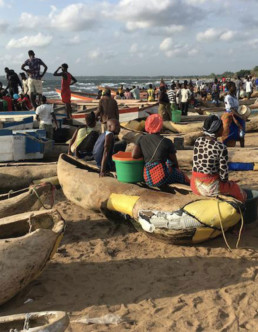
Threats:
Lake Malawi’s fisheries have become over-exploited and the response of fishermen has been to increase effort, using longer nets with smaller mesh sizes (including mosquito nets). Fish are caught before they have a chance to grow and breed and many fish are now classified as endangered or vulnerable on the IUCN Red List. The problem has been exacerbated by a lack of government funds to enforce fishing regulations. As the Lake’s fish are a key source of animal protein for the country’s most vulnerable groups, this has serious nutritional implications. Declining species richness has implications for the resilience and productivity of Lake Malawi’s fisheries, as well as for the overall health of the lake ecosystem.
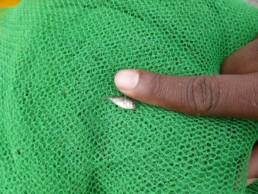
Baby Chambo fish caught in a mosquito net.
The project focuses on Oreochromis lidole (known locally as Chambo) but also benefits other species. By protecting breeding areas and banning fishing with mosquito nets, Beach Village Committees ensure there is increased plant growth providing more protection for baby fish. Young Chambo are be able to grow larger and breed. This helps increase stocks of Chambo and other fish. The project also encourages the use of larger meshed nets to catch larger Usipa — a sardine-like fish — and Utaka.
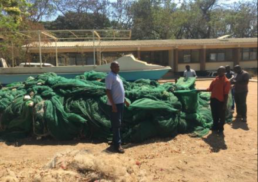
Confiscated mosquito nets used for fishing.
Fishing communities benefit in deriving greater household income from fish catches, which results from healthier and more resilient fish stocks. This provides positive feedback validating the actions taken by the Fish Conservation Committees. Ultimately, the increased number of larger fish available in markets is providing more sustainable animal protein, benefiting many more people in Malawi.
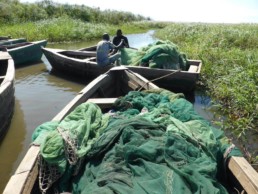
Mosquito nets being used in a fish breeding area.

